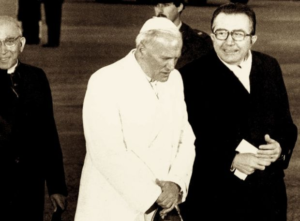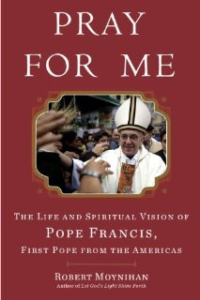May 7, 2013, Tuesday — On the Death of Giulio Andreotti
Giulio Andreotti passed away quietly yesterday in Rome at the age of 94.
He was arguably the single most important Italian statesman of the last 60 years. He was a man of brilliant intelligence, profound culture, great learning, and shrewd political pragmatism. He was a Italian Senator for Life.
He was also a Catholic, attended daily Mass, and for the past 20 years, in his retirement, he directed one of the most important small Catholic journals in the world, the monthly magazine 30 Giorni (30 Days), which closed nearly a year ago, in the summer of 2012. (The animating force behind 30 Giorni was a jovial Italian priest, don Giacomo Tantardini, who was, before his death a few months ago, a close friend of… Cardinal Jorge Mario Bergoglio, now Pope Francis.)
As a leader of Italy throughout the second half of the 20th century — he was Prime Minister on seven different occasions, and eight times Minister of Defense — Andreotti’s historical role, his life’s work, was to be a type of “bridge” between the defeated, Fascist Italy of Benito Mussolini and the Italy now emerging following the fall of the Berlin Wall in 1989 and the emergence of the European Union with its globalizing, secularizing trends.
He was in a similar way a critically important figure in the changing relationship between the Catholic Church and Italy during the past 75 years.
I did not know Andreotti well, but I met him on several occasions and twice had conversations of more than an hour with him. On those occasions, I felt I learned a great deal from him, from what he said and from what he did not say, and even from the words he chose, the turns of phrase he used. Speaking to him was an instruction in the use of the Italian language, and in how to speak well in any language. Speaking with him was to speak with a product of a profound classical education which no longer exists in our world in the same form. He was steeped in the Latin classics, and in Dante. Indeed, to speak with him was in some ways like speaking with one of those very old Italian cardinals, trained in the years before the Council, who are now very few.
On one memorable occasion, purely by chance, I found myself in the Hotel Columbus on the 27th of May in 1987, almost 30 years ago now. There was a long line of people on the stairway waiting to greet a cardinal who was celebrating the 50th anniversary of his priestly ordination. And I found myself standing behind a man with a large head and broad but slightly curved shoulders.
It was Giulio Andreotti.
And the cardinal we were going to greet was Agostino Casaroli (1914-1998), at that time, the Vatican Secretary of State for Pope John Paul II and the man known as “the architect of the Vatican’s Ostpolitik,” that is, the policy of dialogue with the Soviets rather than direct confrontation. (Here is a photo of Andreotti with John Paul II; to the left behind John Paul II is Cardinal Casaroli.)
 The reason I tell this story, the reason I remember the moment, is that I experienced something unique when the two men met.
The reason I tell this story, the reason I remember the moment, is that I experienced something unique when the two men met.
As Andreotti greeted Casaroli, who was the shorter man, their eyes locked. As the next in line, I was only a yard away. They shook hands warmly, and Casaroli’s eyes, intelligent and penetrating, sparkled. And to me the look exchanged between the two men seemed like an electric charge which crackled across the air between them.
It seemed to me a product of the personality and power of the two men, so that, in the gaze they exchanged, one sensed important but unspoken crises and decisions the two had shared. It was a gaze of power, between two men of power. (Andreotti was famous for the phrase “power grows tiresome to those who don’t have it.”)
Andreotti died yesterday just before noontime. The President of Italy sent a message of condolence to his wife, Livia. In it, he said that “only history” will be able to judge Andreotti’s work.
Born in 1919, Andreotti studied law and then entered politics. He was a member of Italy’s Parliament from the age of 26, in 1945, the year the Second World War ended, until the end of his life — almost 70 years. In the post-war years, he became the head of the Catholic University Students Association, succeeding Aldo Moro.
Thirty years later, in the 1970s, Moro, a close friend of Pope Paul VI, would be Italy’s Prime Minister. Moro was kidnapped by the Red Brigades on March 16, 1978. Andreotti then became the leader of the government in Moro’s absence.
Andreotti’s role during the kidnapping of Moro remains controversial. He refused any negotiation with the terrorists, and for this he was sharply criticized by Moro’s family.
Moro was killed by the Red Brigades in May 1978. His body was found in a car just a few yards from the Jewish synagogue of Rome. Not long after, on August 6, Moro’s friend, Paul VI, who had been profoundly shaken by these events, also died.
Andreotti was a protege of Alcide De Gasperi, the founder, with Guido Gonella, of Italy’s Christian Democratic Party. Andreotti ran for public office as a candidate of the Christian Democrats until the party was dissolved in the early 1990s.
Andreotti was the head of Italy’s government from February 1972 to June 1973, from July 1976 to June 1979, and from 1989 to 1992.
The author of numerous books, he was the President of the Center for Ciceronian Studies and of the Dante House of Rome.
Cardinal Achille Silvestrini — Casaroli’s right-hand man in the Vatican diplomacy — in an interview published today by VaticanInsider, said Andreotti was “a great statesman; one cannot understand the history of Italy in the 20th century without the fundamental role of Giuslio Andreotti.” Silvestrini added: “My first thought today was for his very dear wife, Livia, who was always his guardian angel.”
“I pray for you, but I ask you to pray for me, because I am in need of your prayers. Three ‘Hail Marys’ for me…” —Pope Francis, Saturday, May 4
New Book on Pope Francis
 Entitled Pray for Me: The Life and Spiritual Vision of Pope Francis, First Pope from the Americas, my new book on Pope Francis was released on April 30 by Random House.
Entitled Pray for Me: The Life and Spiritual Vision of Pope Francis, First Pope from the Americas, my new book on Pope Francis was released on April 30 by Random House.
Pray for Me is geared toward those who would like to accompany Pope Francis on his journey of faith in the months and years ahead.
Here are links where you can order the book:
1. Amazon
If you would like a signed copy of the book, please call our toll-free number at 1-800-789-9494 in the US. Signed copies will be $30 (all shipping and handling included).
Please consider ordering this book if you enjoy this newsletter. It would be much appreciated.
“Think nothing else but that God ordains all, and where there is no love, put love, and you will draw love out.” –St. John of the Cross







Facebook Comments